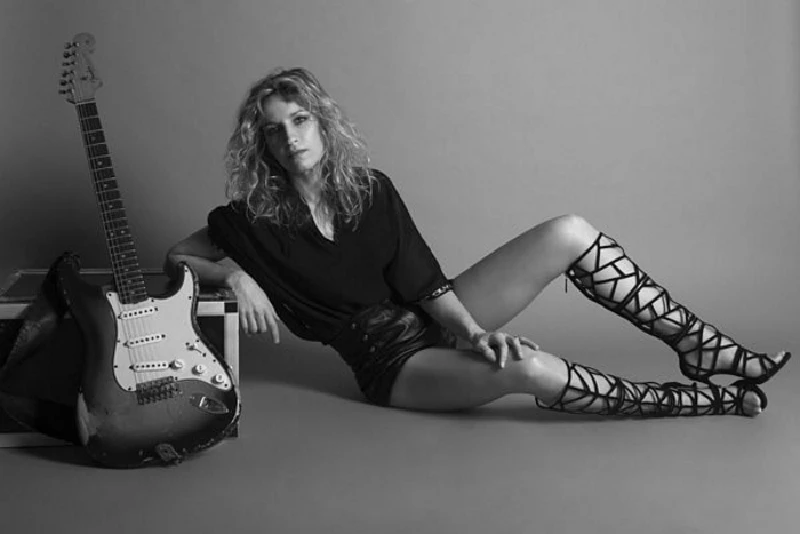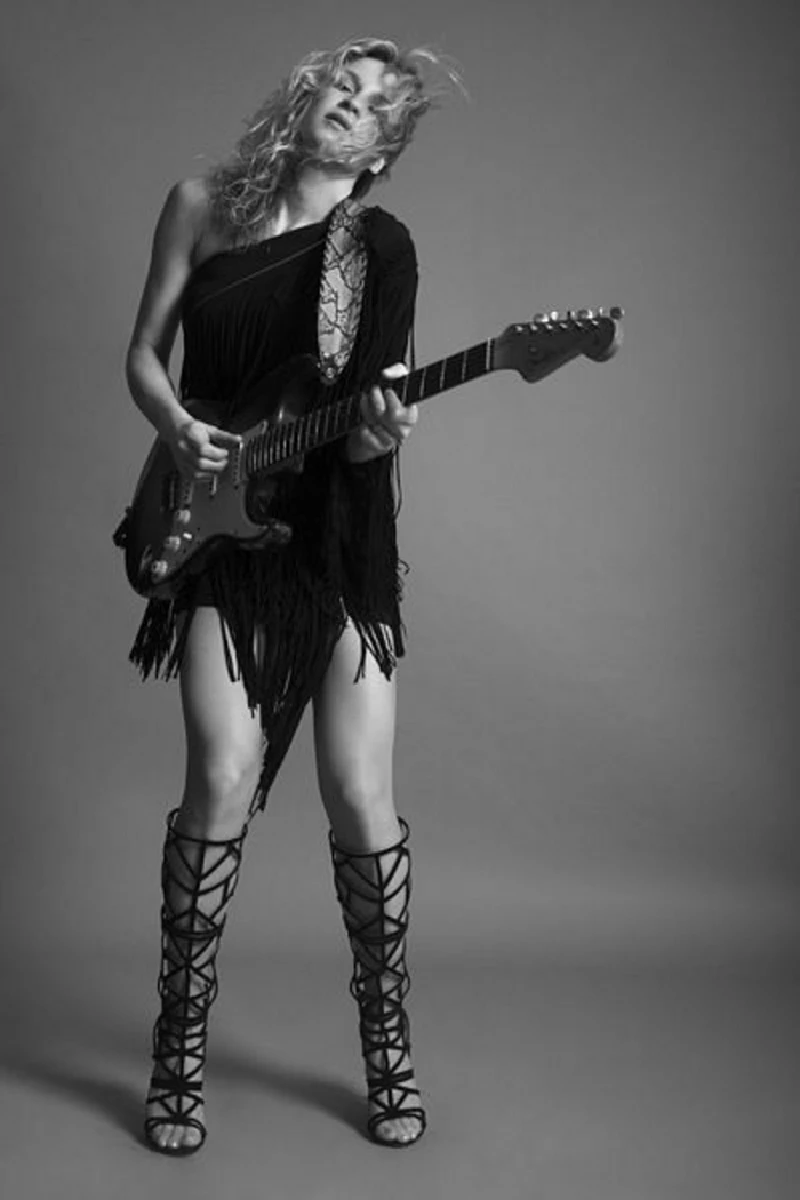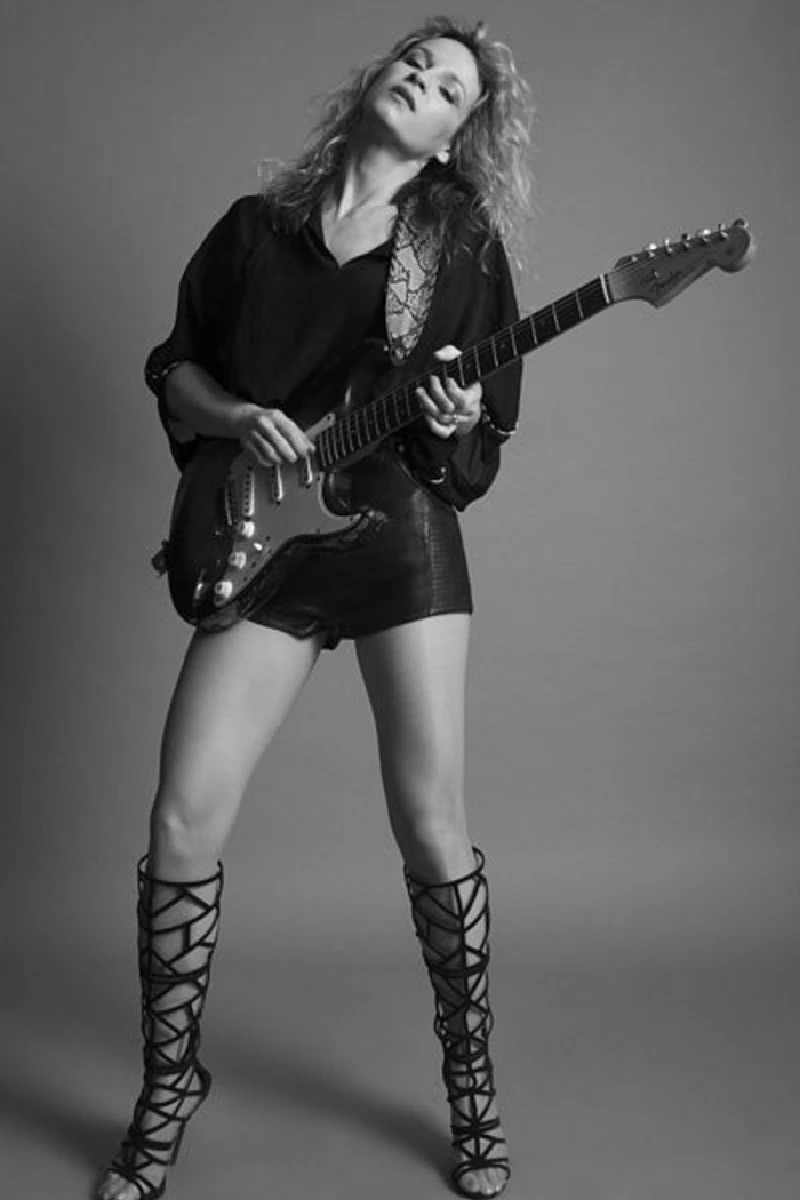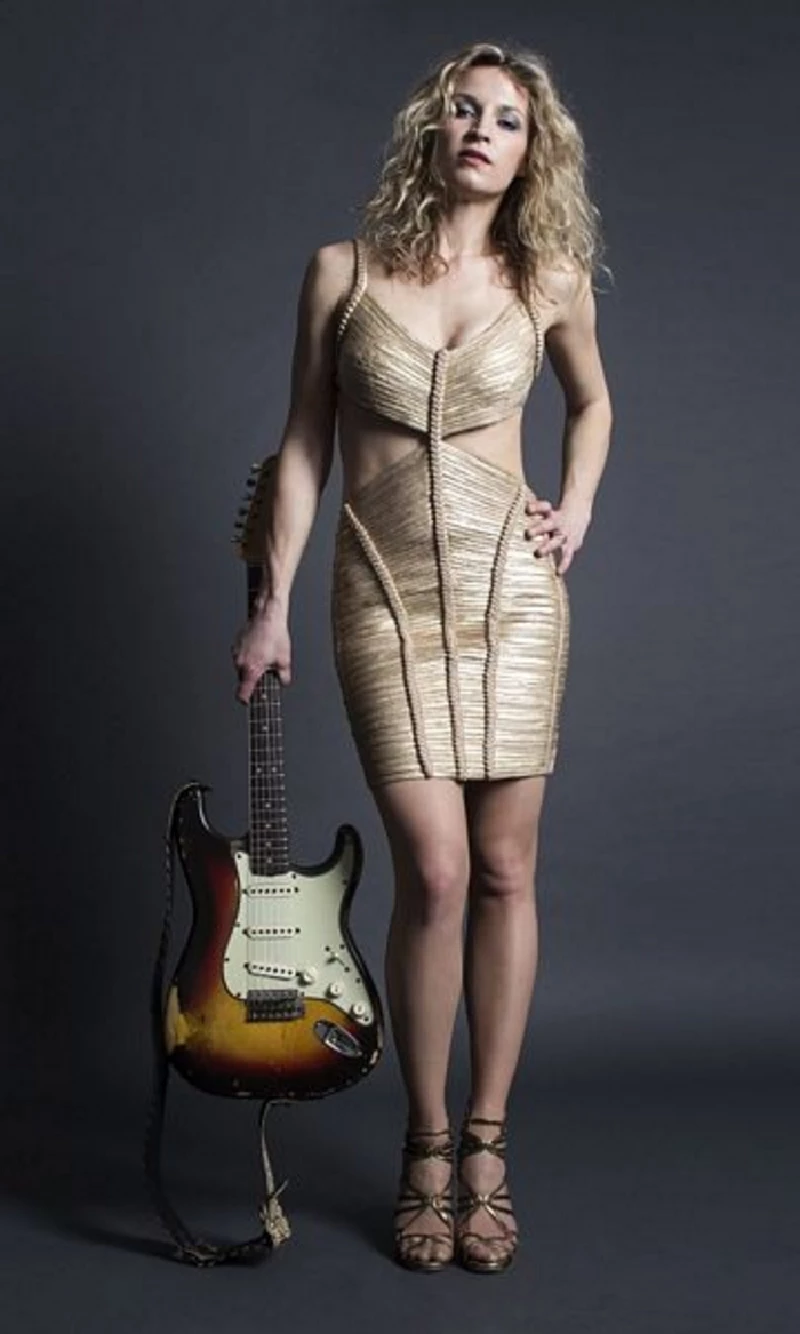Ana Popovic - Interview
by Lisa Torem
published: 10 / 4 / 2016

intro
Blues guitarist/singer/writer Ana Popovic speaks to Lisa Torem about recent three-album project, ‘Trilogy’, working with legends on the Experience Hendrix tour and creating honest music that triggers primal emotions
Although she was born in Belgrade, Ana Popovic wholeheartedly embraced her early exposure to American blues, gospel, jazz and soul. Today she excels as a passionate electric guitarist/singer and songwriter. As a young woman, she became obsessed with Delta recording artists. She drew much inspiration from her father Milton’s recordings and jam sessions in her native home. Ultimately the fiery innovator relocated to Memphis, but, along the way, she garnered acclaim at festivals in New Orleans, recorded the likes of ‘Catfish Blues’, and ‘Evening Shadows’ for masterpiece ‘Blue Room,’ (produced by Jim Gaines), one of her most exploratory works with her father and garnered Top 5 Billboard Awards for: ‘Can You Stand The Heat’, ‘Unconditional’ and ‘Still Making History’. The Experience Hendrix Electric Guitar Festival of 1995 was launched in Seattle by family member James Hendrix to celebrate Jimi’s legacy. Since that time, it has garnered a reputation as a dynamic tour that solicits world-class players. Ana Popovic is one such performer. After glowing reviews in 2014, she was invited back in 2016, where she will join the likes of Mato Nanji, Jonny Lang, bassist Billy Cox (Band of Gypsys, Jimi Hendrix Experience) and more than twenty other Hendrix-inspired artists for a nationwide American tour. This year Ana will also entertain fans across Europe with her own tight team of pros. Last year, she sailed on the 'Keeping the Blues Alive at Sea' cruise with Joe Bonamassa, where she showcased her live act and mingled with international fans. Now for this Pennyblackmusic interview, Ana guides us through the much-anticipated ‘Trilogy’ CD project, elaborates on the legends that inspired her own career and talks about “the zone.” PB: Your father was your earliest blues mentor, wasn’t he? You ultimately recorded ‘Blue Room’ with him. If he were in the room with you now, what would you say about his influence and your working relationship? AP: ‘Blue Room’ was a record I had initially done for myself and for my children. I wasn’t sure if we would get a song or two to release, but it turned out all of the songs made it to a “father’s day” release record. It’s dedicated to all the dads that support their guitar players, artists, and musicians. Milton and I were playing those same songs for years. Although Milton was never a professional musician, he is a music lover and just plays for a hobby. It was wonderful to spend time playing those songs from long ago and to witness Milton feeling so “at home” in the studio. It was like he always was just doing that, recording and playing music. He was himself in the studio, like he’s been doing that forever. I personally just love his slow hand playing and the tone of his voice when he sings. I overall like to encourage people that are not professional musicians to get together and play music even if for fun. Sometimes these jams really don’t sound that bad and they’ll have a great evening. It’s way better than sitting in front of the TV. PB: You have cited BB King, Albert King, Django Reinhardt and Stevie Ray Vaughan as guitar heroes, and more specifically, Sonny Landreth and Elmore James as slide innovators. Can you name a few songs by these artists that motivated you to write your own material or to try a new arranging technique? AP: I love ‘Lenny’ by Stevie Ray Vaughan. I think it’s one of the most beautiful instrumentals ever recorded in the guitar world. I love Django Reinhardt ‘Nuages’ ('Clouds'), which is another great masterpiece. BB King, anything from ‘Live at the Regal’, Albert King -- a king of slow blues-- ‘As The Years Go Passing By’; Sonny Landreth’s ‘Congo Square’ and Elmore James’s ‘It Hurts Me Too’. PB: Some suggest that your sixth album, ‘Unconditional’ significantly reflected your feelings about live performance. Do you consider this album a milestone? AP: It was, both as a writing achievement and as a guitar record, and arrangements were very well thought of. This is the first CD that I took charge of, the way it was recorded and in which I started to really polish the stuff if I wasn’t happy with the mixes or with the direction it was going in. I was taking on the producer’s role for the first time in my career. PB: What generally sparks an idea for an original song/arrangement? Can you select one of your favourite originals and explain the process of creating it? AP: To me, anything I haven’t heard before. It’s got to be different. I don’t like writing clichés. It’s got to be something that’s going to inspire, something that’s going to make people think, that’s going to discover someone’s hidden passions. On ‘Trilogy’ I have all kinds of songs, from environmental songs and political songs to pushing-your-limits songs to love songs, break-up songs and one-night-stand songs. Everything’s got its place as long as it’s not been done in such a way before. PB: Shredding requires major concentration. You really do it all: sing, write, perform solo and switch to rhythm onstage. What are you thinking about as you perform and what strengths do your band members have that equip them to support you? AP: On a good night, I’m simply somewhere else. I’m in the zone: My instrument, my band and me. Its emotions, feelings; everything is coming loose through music. My band has to absolutely bring their personality to the band. I’m a bandleader but I want to be inspired by the great musicians that they are. I give them a lot of freedom but ask much in return, too. Every night needs to be spot-on. I love what I do so much so I surround myself with musicians who equally enjoy breaking new ground and improving with each time. I hate band rehearsals. I require the band to be fully prepared when working on the new material so the rehearsals are only for improvising and finding fun arrangements and getting input from the band and myself; not for learning songs. PB: What has been most valuable to you as a player/performer: listening to recordings, watching tutorials, jamming with other players or studying privately? AP: It was all four that you mentioned. You can’t make it if you’re not doing all those four things. PB: Your latest and ambitious project ‘Trilogy’ contains three albums in one and benefits from the expertise of producers: Warren Riker (Santana), Tom Hambridge (Buddy Guy) and top trombone arranger Delfeayo Marsalis as well as multiple guests. What role does each producer fill and who are the artists? Stylistically, what should we expect to hear? Will you support ‘Trilogy’ with an international tour? AP: ‘Trilogy’ is a celebration of music and musicianship. It took a lot of preparation. In a way, all three CDs are so different (Jazz, Blues/Rock and Soul/Funk), but they are at the same time a part of the same thing. It resembles this specific time in my career, my influences as a guitar player and singer, as wide as they are. Influences from blues and rock from Volume 2; to Joe Pass, George Benson on Volume 3; and whole soul and funk undertaking on Volume 1. I felt I was simply ready for a big record, for a big body of work. I felt it was time for that. All these songs have a mysterious connection although I recorded them to sound as differently as possible, like if you would collect three of your favourite artists in three different genres of music. I was surprised to see how well those songs fit together; being so differently recorded and I felt I shouldn’t take them apart. It’s a project I’m very proud of. To be able to do something like this at this stage in my career is, to me, a real personal success. The recording process was very different than any of my previous records. All the songs are carefully chosen to fit the exact genre. They were written in that manner: To fit the jazz album or a soul//funk record, or the blues and rock style that my fans really love to hear. Then I carefully chose the musicians and producers to fit those particular songs. A great drummer or a bass player can be really great in one genre, and good or okay in others and I’d find musicians to play only what they are really great in. I featured them in the genre of music that they’ve mastered and have them do only that. So there have been three different sessions planned in different studios with different amazing line-ups and finally having those songs produced by three different producers to have them sound like three different artists. It’s been such a great experience. I can’t imagine going back to the previous way of recording twelve tracks with one band and one producer. Some of the special guests are: Joe Bonamassa, Robert Randolph, Delfeayo Marsalis, Cody Dickinson (Mississippi Allstars), rapper Al Capone, Bernard Purdie, Ivan Neville, George Porter Jr., etc. PB: Why do you think you’ve been one of the only females selected to appear on the Experience Hendrix tours? AP: I’ve been playing Jimi’s songs on and off throughout my whole career, songs like ‘Belly Button Window’, ‘House Burning Down’, ‘Crosstown Traffic’ and ‘Can You See Me’. Maybe the choice of the songs made them choose me. I know they loved the fact that I don’t cover the usual “hit” songs. I am more of a B-side person. I love the hidden treasures. Experience Hendrix was a tour I wanted to be a part of for a long time. I’ve been a fan of Jimi my whole life and a tour put together by Jimi’s family is not just a cover gig. It’s the real deal. Knowing that the tour didn’t have many women in the past, I took it as a huge honour and privilege to be a part of it for the third time. To be able to play my choice of Jimi’s songs for his fans and audience of all these incredible performers is really a dream come true for me, Hopefully we’ll have more female guitar players on the major guitar events in the future, too. PB: Will you be performing with other members of the line-up on tour? If so, who are you most looking forward to performing with? AP: Every tour is different. My favourite moments were playing with not one but two legends on stage: Buddy Guy and Billy Cox. It was just the three of us on a final jam for a few nights in a row. You can’t ask for more if you’re a blues fan; I’m also playing with Dweezil Zappa and Mato Nanji who are fantastic. PB: Thank you. Photos by Ruben Tomas www.rubentomas.com
Band Links:-
http://anapopovic.comhttps://www.facebook.com/AnaPopovicMusic
https://twitter.com/anapopovic
Picture Gallery:-



soundcloud
most viewed articles
current edition
John McKay - InterviewRobert Forster - Interview
Cathode Ray - Interview
Spear Of Destiny - Interview
Fiona Hutchings - Interview
When Rivers Meet - Waterfront, Norwich, 29/5/2025
Carl Ewens - David Bowie 1964 to 1982 On Track: Every Album, Every Song
Chris Wade - Interview
Brian Wilson - Ten Songs That Made Me Love...
Shrag - Huw Stephens Session 08.12.10 and Marc Riley Session 21.03.12
previous editions
Heavenly - P.U.N.K. Girl EPBoomtown Rats - Ten Songs That Made Me Love....
Allan Clarke - Interview
Manic Street Preachers - (Gig of a Lifetime) Millennium Stadium, Cardiff, December 1999
Oasis - Oasis, Earl's Court, London, 1995
Barrie Barlow - Interview
Dwina Gibb - Interview
Beautiful South - Ten Songs That Made Me Love...
Pixies - Ten Songs That Made Me Love...
Sound - Interview with Bi Marshall Part 1
most viewed reviews
current edition
Peter Doolan - I Am a Tree Rooted to the Spot and a Snake Moves Around Me,in a CircleVinny Peculiar - Things Too Long Left Unsaid
Garbage - Let All That We Imagine Be The Light
Vultures - Liz Kershaw Session 16.06.88
John McKay - Sixes and #Sevens
Little Simz - Lotus
HAIM - I Quit
Morcheeba - Escape The Chaos
Eddie Chacon - Lay Low
Billy Nomates - Metalhorse
Pennyblackmusic Regular Contributors
Adrian Janes
Amanda J. Window
Andrew Twambley
Anthony Dhanendran
Benjamin Howarth
Cila Warncke
Daniel Cressey
Darren Aston
Dastardly
Dave Goodwin
Denzil Watson
Dominic B. Simpson
Eoghan Lyng
Fiona Hutchings
Harry Sherriff
Helen Tipping
Jamie Rowland
John Clarkson
Julie Cruickshank
Kimberly Bright
Lisa Torem
Maarten Schiethart